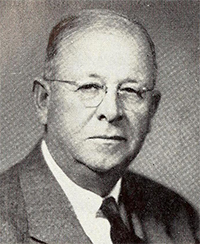17 Oct. 1881–19 Jan. 1955

Paul Howard Rose, founder of the chain of Roses Stores, was born in Jackson of Scottish and English ancestry. He was the son of Thomas Bragg Rose, a cabinetmaker and wheelwright, and his wife, Andrew Etta Warrick.
Born during a period when money was scarce, Rose soon learned the necessity to work. His talent for merchandising came early. As a boy in Jackson and Seaboard, he cut lightwood splinters and bundled and sold them; his mother baked cookies for him to sell; and he concocted a drink made of vinegar and soda that sold well. Later he obtained a large wooden packing case for his first place of business and stocked it with assorted items. A friendly doctor-druggist allowed him to put the case in his drugstore each night.
His formal education was limited, but he was always determined to study and to improve his mind. While in his teens, he learned to be a telegraph operator and found work utilizing his training. Rose studied the printing trade, acquired a large foot press and cases of type, and at one time published a trade magazine. He also learned the art of sign painting. Later he attended a business school in Norfolk, Va., and soon became a stenographer for a tobacco firm. All of this stood him in good stead when he decided to go into business for himself.
After finishing his schooling Rose opened his first "real" store in Littleton. His capital was very limited and to make his store look full he ordered empty shoe boxes to fill many of the shelves. He also bought remnants of material to wrap around pieces of cardboard to give the appearance of full bolts of cloth.
Rose was a great sales promoter. In his little store, he featured candy by staging a Popular Girl Contest. As a result of this promotion, he sold a quantity of candy that was out of proportion to the size town. He also attracted the attention of the manufacturers from whom he purchased most of his candy, and they promptly summoned him to New York with an offer to represent their line in all of the southeastern states. Being a natural-born salesman he soon established a good sales record. Because he called on only one merchant in each city, he had considerable time on his hands between trains (in those days there were no automobiles for the traveling salesmen). This gave him an opportunity to approach the five-and-tens in the places he visited and discuss the problems of merchandising with the managers. During this period he conceived the idea of organizing a buying syndicate to consolidate stores' purchases in order to obtain better prices. This buying association proved to be successful and was, in effect, the forerunner of several such modern buying organizations.
Every worthwhile endeavor must have an objective, and Rose's goal was to own a chain of stores. So he decided to abandon the buying organization and his Littleton store and start a chain of stores known as the United 5 & 10¢ Stores. He and two other men formed a partnership and opened several units, one in Henderson and another in Charlotte. Competition was keen, and sales were disappointing. This prompted one of the partners to withhold the money he had agreed to put into the new venture, which left the young and struggling business without sufficient capital to survive. It was a difficult time for Rose because he found himself financially embarrassed and his business reputation and integrity at stake. Yet disappointment did not conquer his spirit of enthusiasm nor lessen his determination to own and operate a chain of stores. He believed where there is a hill, there is a valley; where there is a disappointment, there is a compensating blessing. He borrowed $500 from his brother-in-law to buy the Henderson unit of the defunct United Stores and negotiated an agreement with the creditors to pay them $50 a week until the purchase price of the store was paid in full. Thus was started in 1915 the first unit of what was destined to be the chain of Roses Stores, Inc., consisting of 250 variety and junior department stores located in eleven southeastern states, three distribution warehouses, a fixture manufacturing plant, and a fleet of trucks.
Rose was active in the Methodist church, of which he was a member. He also took a lively interest in the Rotary Club and all community projects. Though a lifelong Democrat, he had no political aspirations. He shunned publicity for himself but sought it vigorously for his stores. On 13 Sept. 1911 he married Emma Myrick of Littleton and they were the parents of four daughters: Virginia Edgerton, Jessie Myrick (m. L. H. Harvin, Jr.), Alice Warrick (m. William J. Vaughan), and Emma Thomas (m. John T. Church). Rose was buried in Henderson.